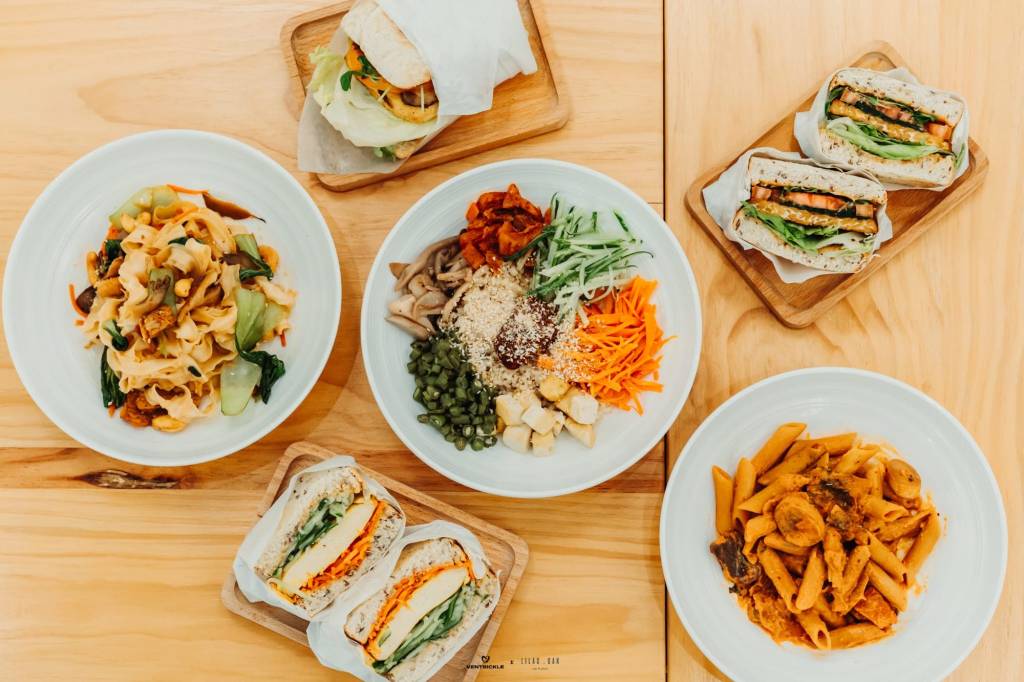At the edge of Oxley Rise, where the roads run quiet and trees cast soft shade over the footpaths, sits a small café called Lilac Oak. It doesn’t try to draw a crowd. There are no kiosks, no QR codes, no gimmicks. Just a paper menu, clipped together and Chloe Lee, the woman behind the food, the stories, and the gentle smile that meets you at the door.
Chloe grew up watching her grandmother in the kitchen, learning to cook rice the old-school way. Fingers dipped in water for measurement, steam rising from battered pots. The kitchen was where her family gathered, and where love took the shape of food. Her dream of owning a café began in that warmth. But it was her mother who gave the dream its purpose.
When her mum turned fully vegan for Buddhist reasons, meals became more complicated. Favourite dishes were suddenly off-limits. Chloe began experimenting not to follow a trend, but to give something back. To bring joy and ease back to the act of eating. The allium-free vegan kimchi came first. Then the pineapple tarts her mum missed every Chinese New Year. Chloe still remembers how hard it was to replicate that melt-in-your-mouth texture — the kind that usually comes from a mountain of butter. She found a way. Her mum now buys tubs of them every year, stores them in the fridge, and eats one a day until the next Lunar New Year.
 Twice the Taro Tarts
Twice the Taro Tarts
And then there was the Orh Nee tart. A reimagined take on the Teochew classic Chloe’s grandmother taught her to make: steaming yam, mashing it with a butcher’s knife, frying it in lard and shallot oil. Chloe created a lighter version that reflected how her family eats now. It wasn’t meant to recreate the past. It was meant to honour it and to bring everyone back to the table, together, with food that feels good in every sense.
She started from home, baking from a small kitchen with an overworked oven and more heart than space. Deliveries were packed by hand. Her family helped fold boxes. In 2021, she opened the doors to Lilac Oak, just as Singapore was easing out of Covid restrictions. That same year, she became a mother.
There were days she winced at the smell of mushrooms. Days she drifted to sleep mid-prep. And days she carried her newborn while taking orders. Her husband stepped into the kitchen. Family lent their hands. The café didn’t grow from capital. It grew from care.
There is no automation at Lilac Oak. Chloe never wanted it. Not because it wasn’t efficient, but because it didn’t feel right. Presence matters at Lilac Oak. She remembers your allergies. She notices when you’re tired. She offers tea before you even ask. These small acts are the currency of connection.
But some days are heavy. Lease renewals come with doubt. Footfall wavers. Reviews can feel personal. Chloe often feels caught in the middle. Too small for grants and media attention, too big for the home-based spotlight, too stubborn in her values to cut corners.

What keeps her going is rarely big. It’s the thank you from a customer. The parent whose allergic child finally has options. Or the regular who shows up for the waffles they grew to love, and for the warmth that’s been there all along.
It’s also one night, not long ago, when her husband asked their toddler what she wanted to be when she grew up. She replied, “I want to work in Lilac Oak. But I want to make it blue.”
That moment lives at the heart of the café.
Chloe’s daughter is now three. She pipes tarts, greets regulars, and calls herself Head Taster. Regulars have watched her grow up behind the counter, quietly sharing in the slow, steady life of the café as it grows with them. What Chloe is building isn’t a brand. It’s a space where people feel like they belong. A community stitched together by care, conversation, and a shared belief in living gently.
What she hopes her daughter remembers one day isn’t just the café. It’s the way they built a life, side by side, with their community, with their hearts wide open. She hopes her daughter remembers the joy of helping a customer, the beauty of making something by hand, and the strength of showing up even when it’s hard.

Everything at Lilac Oak is treated with care. The vegetables are washed in a plant-based cleaner. The food is made the way Chloe would serve her family. If it’s not good enough for her daughter, it doesn’t go on a plate.
Her mother still comes by. Sometimes to eat, sometimes just to sit. Her grandmother lives on in the recipes, in the memories, in the hands that still carry her teachings.
The legacy Chloe is shaping isn’t measured in scale. It’s measured in trust. In familiarity. In the feeling you get when you realise someone remembered you. Lilac Oak isn’t big. But it’s full, of history, of intention, of women quietly teaching each other how to care.
Here, every cup of tea, every slice of tart, every thank you offered and received, is part of something whole.
“You don’t have to be vegan to feel at home here,” Chloe says. “Just come hungry, and leave a little more nourished.”
This is what she wants to pass down. Not just a café. A way of living. A way of caring. A way of making space for softness in a world that forgets to slow down.
Images: Lilac Oak

Leave a Reply